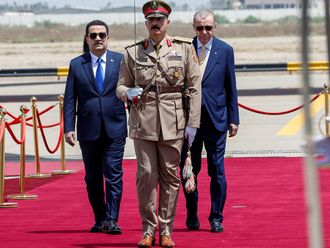London: A hunger-striking Palestinian prisoner, whose detention without charge in Israel has sparked violent protests across the West Bank, has called on the British government to force Israel to abandon its practice of administrative detention.
Writing in Comment is free, Samer Essawi, who was hospitalised last Wednesday evening having refused food for more than 210 days in protest at his imprisonment, argues that Britain should take responsibility for its role in the genesis of the Israeli-Palestinian conflict and the subsequent suffering of Palestinians.
Pointing to the UK’s “historic responsibility for the tragedy of my people”, he says the British government should impose sanctions on Israel, “until it ends the occupation, recognises Palestinian rights and frees all Palestinian political prisoners”.
“Israel would not dare continue its oppression of the Palestinians without the support of western governments,” Essawi writes.
Essawi, who was affiliated with the Democratic Front for the Liberation of Palestine, was arrested in April 2002 and sentenced to 26 years in prison for membership of an illegal organisation, attempted murder and possession of explosives. During the second intifada [uprising], he allegedly manufactured and distributed pipe bombs and in several incidents, opened fire indiscriminately on Israeli civilian vehicles.
Hundreds of Palestinian protesters met Israeli soldiers in clashes across the West Bank following midday prayers last Friday. Demonstrations were organised in support of the hunger strikers at flashpoints including Ofer prison, Qalandiya checkpoint and Biliin — a village whose struggle against encroaching Israeli colonies was captured in the Oscar-nominated documentary 5 Broken Cameras.
Tareq Qaadan and Jafar Ezz Al Deen abandoned their hunger strike last week after a deal was struck securing their release at the end of May. Negotiations are now under way to resolve the cases of Essawi and Ayman Sharawna. Sharawna, who has been on intermittent hunger strike since July, is also under observation in hospital. Both men were freed by Israel as part of the Gilad Shalit prisoner exchange in 2011 but subsequently rearrested for violating the terms of their release, charges they deny.
“The Israeli side has begun dialogue today to find a solution to this issue, but so far they have not presented an acceptable offer,” Eisa Qaraqei, the Palestinian National Authority’s minister for prisons, told reporters on Friday, adding that Essawi and Sharawna had refused an offer to be freed and deported.
Sivan Weizman, a spokesperson for the Israeli prison service, has claimed that Essawi’s condition was stable but “it’s better that he be in hospital”.











